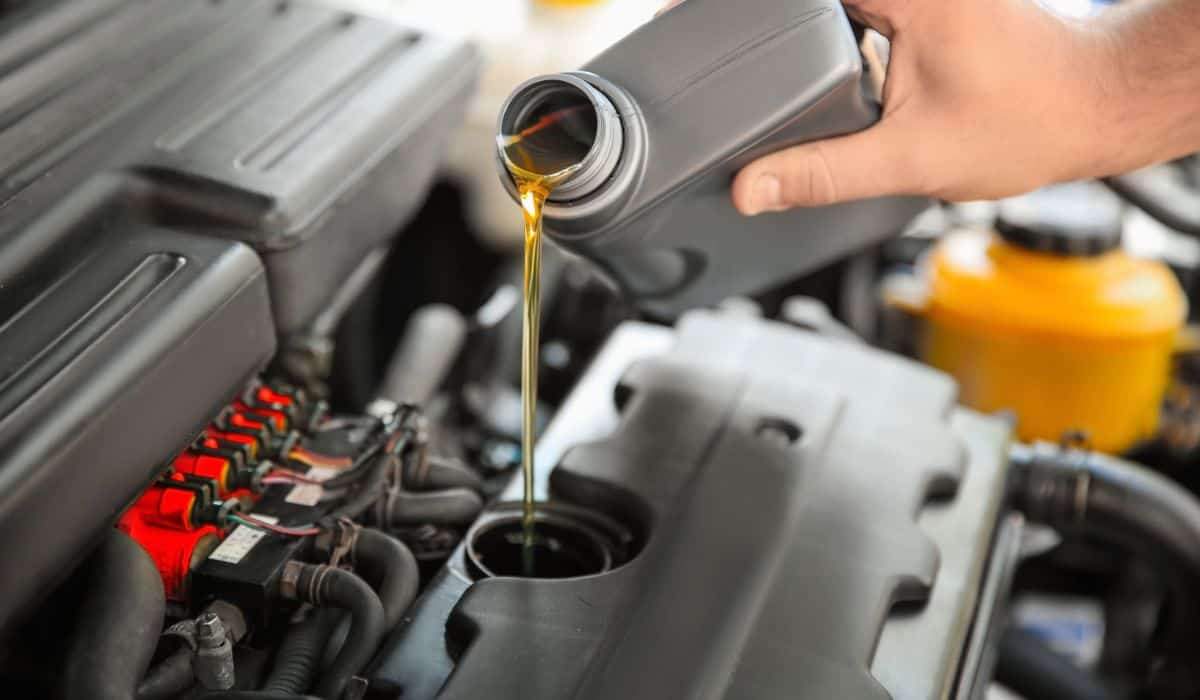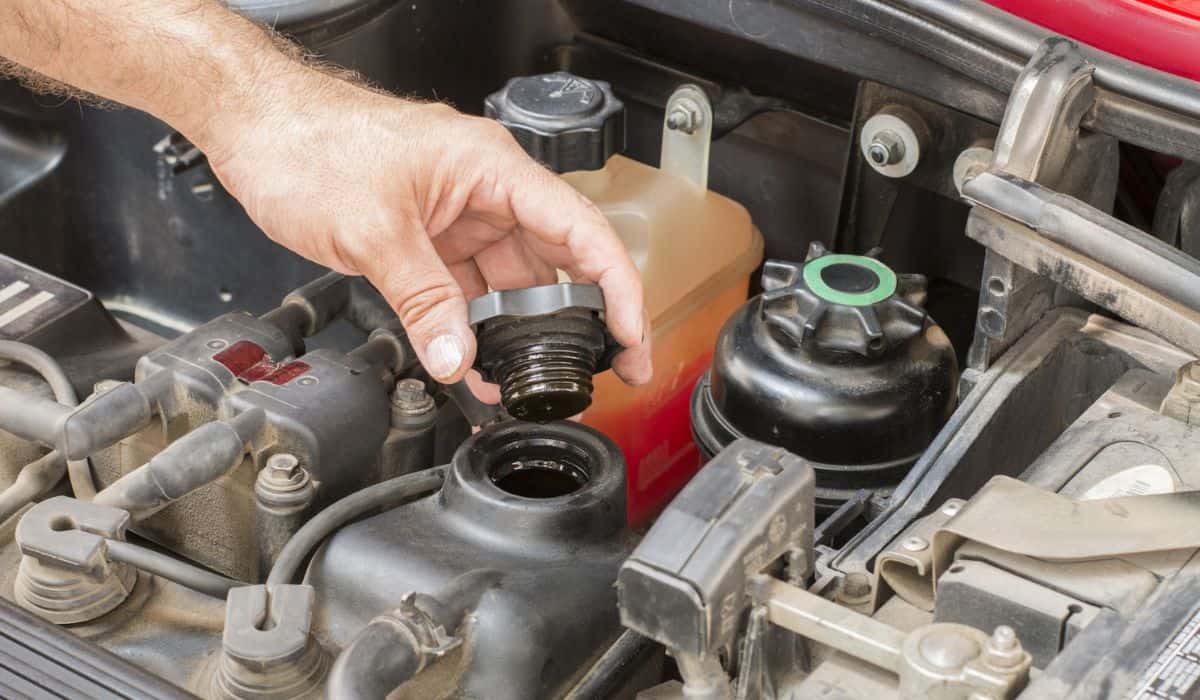How Hot Does Car Engine Oil Get?
Engine oil is essential to any car, since it keeps the engine lubricated. It’s important to fill the engine oil with high-quality oil to ensure that your car runs smoothly. However, synthetic oil can also damage your engine if it gets too hot. So, how hot does car engine oil get, and what’s a safe temperature for your engine?
Engine oil temperature is typically between 230 and 260 ˚F. Anything below 220˚ won’t be hot enough. Conventional engine oil also shouldn’t cross the 275 °F threshold or it may damage your car. Synthetic oils can get much hotter; some can withstand temperatures up to 450 ˚F.
Let’s discuss how hot engine oil can get, the risks of using overheated oil, and what to do if your oil overheats.
How Hot Does Engine Oil Get?

The engine oil for gasoline and diesel cars works best when heated to an optimal temperature. However, if the engine oil is well below or above the ideal temperature, it won’t lubricate the engine’s internal components. If that happens, your car won’t accelerate properly.
To avoid car performance issues, you should therefore make sure your car’s engine oil reaches its ideal heat capacity.
Maximum Temperature for Engine Oil
When the engine oil heats up to a certain point (generally above 220 ˚F), it protects the engine components from damage. However, the engine oil also has a maximum temperature limit. If your engine oil crosses the heating threshold, it’ll damage your car rather than protect it.
The maximum heating capacity depends on the type of oil you’re using and the engine model installed in your car. According to automobile experts, traditional engine oil can handle a maximum temperature of around 250 °F, and it’ll start to break down if it gets past 275 ˚F.
However, some synthetic oils and the latest engine models can get much, much hotter. Some can even withstand temperatures of up to 450 ˚F.
It’s highly recommended to keep your engine from exceeding its maximum heating capacity to avoid engine breakdown.
Average Temperature for Engine Oil
If nothing is wrong with the combustion process within the internal components of your engine, then the oil will reach the average temperature range of 230-260 °F. This range is also acceptable for your car because most engines stay within this limit.
However, you must ensure your engine oil doesn’t go below this average temperature range. If that happens, your engine won’t get the heat required for accelerating your car or even starting it properly.
When there’s a lack of proper heat, it will result in the accumulation of cold engine oil. If that happens, there will be unwanted friction within the engine valves and cylinders which can cause severe damage to the engine.
So, if you don’t want to go through this issue, ensure your engine oil temperature doesn’t drop below 220 °F.
If your engine oil stays within the recommended temperature range, you won’t face any engine problems, and your car will also give you a smooth drive. Staying with the recommended engine oil temperature can also increase your engine components’ longevity.
At What Temperature Does Engine Oil Overheat?
Many cars manufactured today use smaller but more powerful engines that ensure maximum speed and fuel economy without the threat of engine breakdown. However, even a high-quality engine has its limits.
If you’re always driving your car at high speed on uneven roads or using your vehicle for heavy loads, it’ll reach its limit after a shorter period. This is because your car’s performance depends on its engine; an overworked engine causes overheated engine oil.
Your engine oil overheats at a temperature above 260 °F. Many automobile experts say the moment your engine reaches 275 °F, you’ve driven the final nail in the coffin for your car. This temperature will bring down the performance of your engine and also decrease its life.
Overheating is never a good idea, regardless of the type of oil you use. This is because it decreases fuel economy, increases oil consumption, and results in debris buildup. In addition, if the oil is too hot, its quality gets degraded, which can damage the metallic part of your engine.
In the worst-case scenario, when the temperature is too high for your engine to bear, it might shut down completely.
What Happens if Engine Oil Gets Too Hot?
Overheated engine oil can cause multiple problems with your engine — and these can be quite expensive to fix. The worst problem that can take place within your engine due to overheated oil is a thermal breakdown.
A thermal breakdown is a problem that occurs when your engine oil is too hot. It’s a chemical reaction within the engine oil that damages the internal components of your engine, such as valves, cylinders, or other metallic parts.
When your engine oil heats up beyond its maximum limit, it begins to degrade and changes the viscosity of the engine oil entirely. Viscosity can also be referred to as the weight of the engine oil.
In addition, in the case of thermal breakdown, the engine oil won’t flow smoothly within the engine. As a result, the internal components aren’t adequately lubricated with engine oil.
When engine oil is too hot, it becomes thick, which results in increased oil composition. Unfortunately, this thickness can also increase friction when the engine oil is circulating, causing wear and tear in different internal parts.
Due to thermal breakdown, you might also smell a burning odor from your engine. This isn’t a good sign, as it indicates debris accumulation, residue, and deposit buildup, which can block narrow oil passageways due to clogging. This decreases your engine’s power and acceleration as well.
Furthermore, overheated engine oil can also release harmful and poisonous gasses from your car’s exhaust system. The residue produced from these compounds can damage your exhaust valves.
Therefore, if your engine oil is too hot, it not only damages the internal components of your engine but it can also cause wear and tear to other expensive systems installed in your car.
How Long Does It Take Engine Oil to Cool?

If your engine gets too hot, you’ll have to wait at least 20 minutes for the oil to cool down. However, you’ll have to wait longer for vehicles with bigger engines.
You’ll also need to change your engine oil if it overheats. Follow these steps to do so:
- Park your car on level ground and shut it down completely.
- Leave the car for 20 to 30 minutes, so that the oil can cool down. Then, wear thick gloves and unscrew the oil filler cap to open it.
- Use a pan and drain the oil from your car into it. Use the funnel to add fresh oil to your car, and make sure you fill it to the recommended level. Overfilling is not a good idea.
- Finally, plug back the oil filler cap and make sure it’s tightly shut.
The best way to ensure the engine oil doesn’t get too hot is to change it regularly. Of course, you must follow the oil changing process recommended by the manufacturer, or you can visit a mechanic regularly to get the job done.
